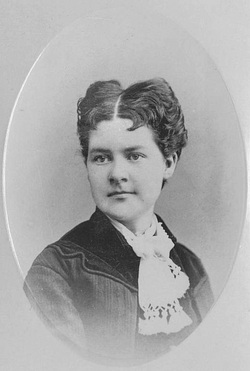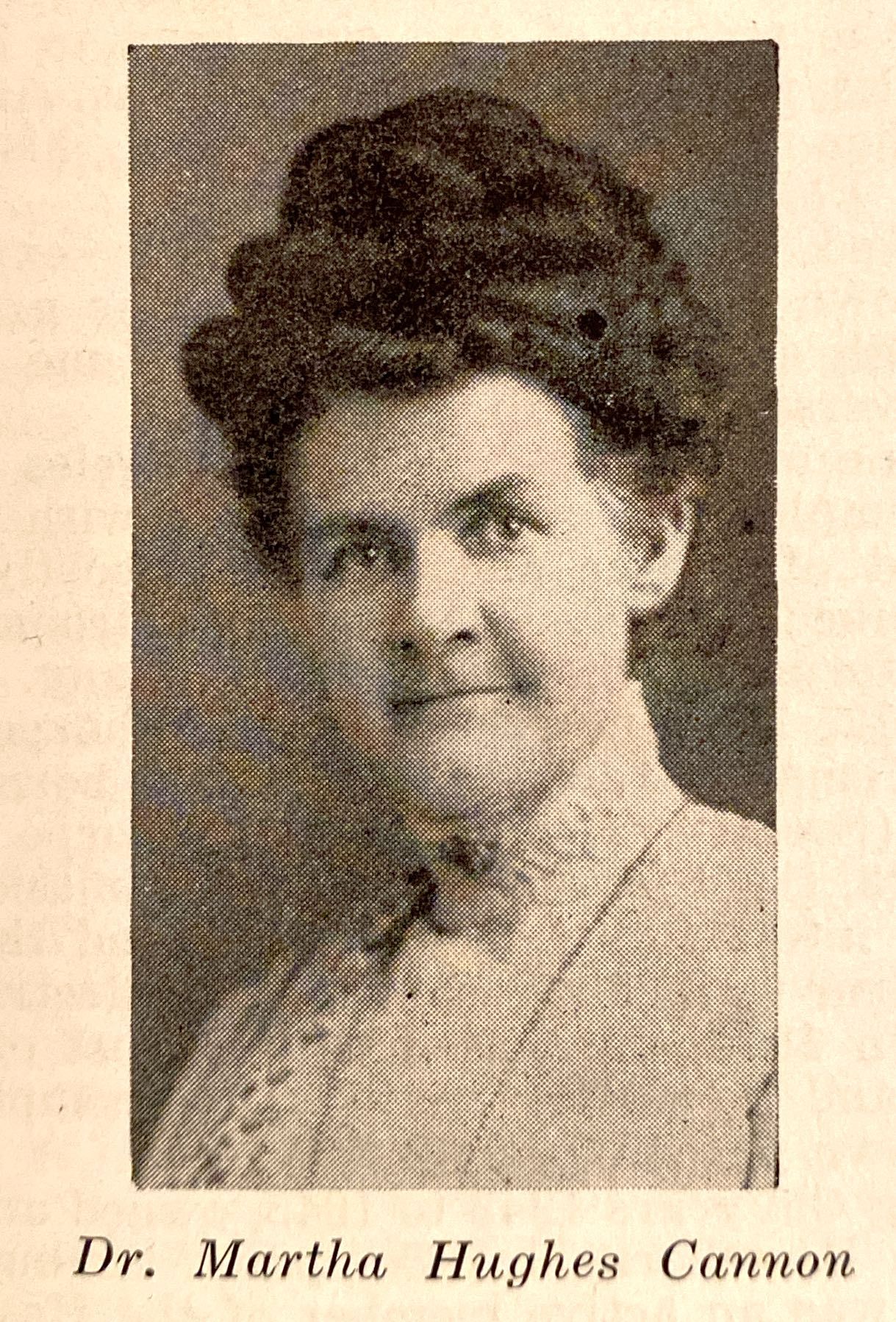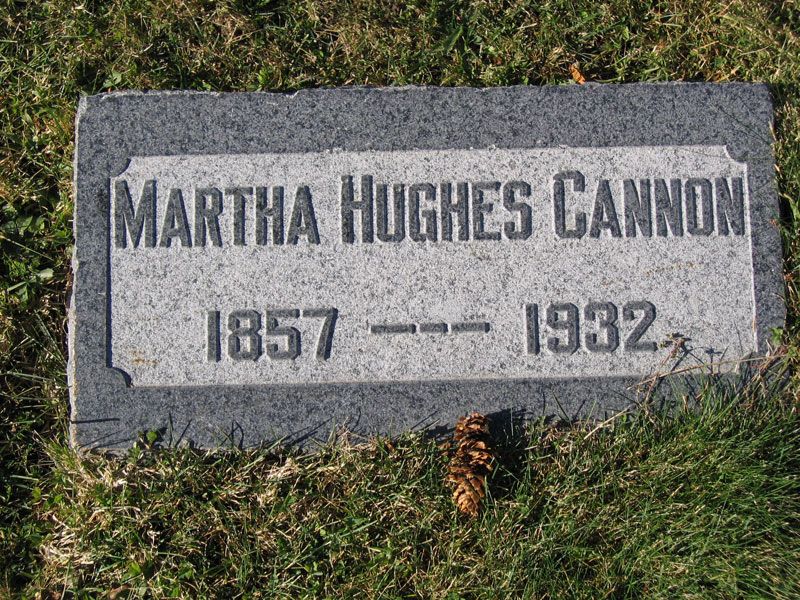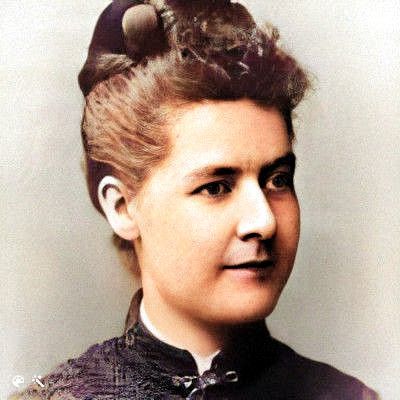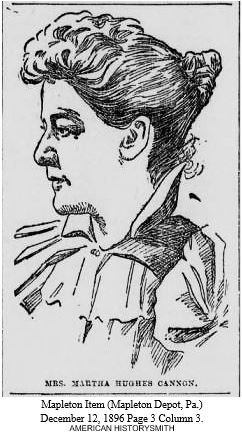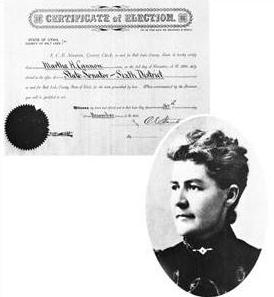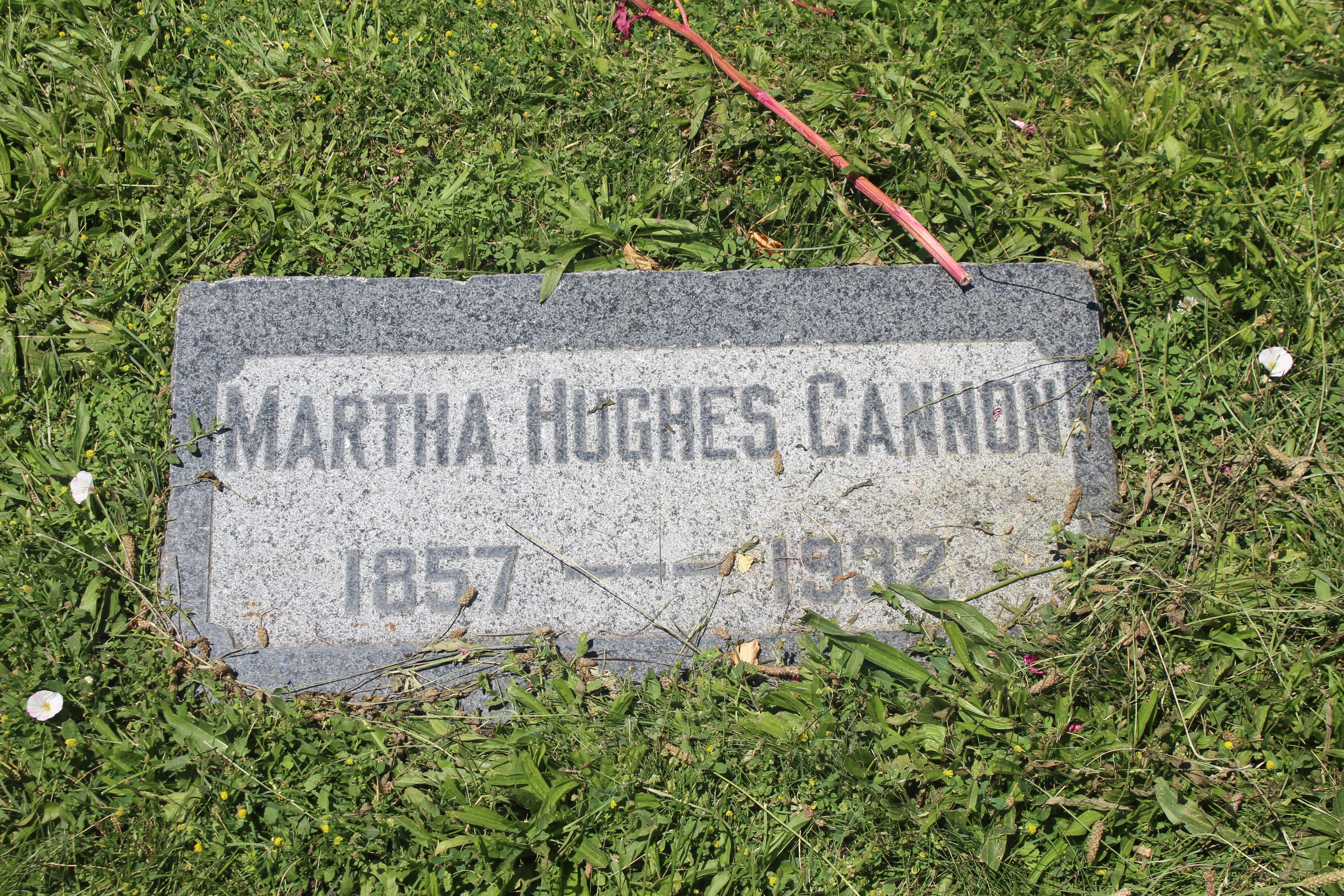Born at Llandudno, Caernarvon, North Wales
Daughter of Peter Hughes and Elizabeth Evans
Married Angus Munn Cannon, 6 Oct 1884, Salt Lake City, Salt Lake, Utah
Children - Gwendolyn Hughes Cannon, James Hughes Cannon, Elizabeth Rachel Cannon
History - One of the first Utah women to receive the degree of M.D. was Martha Hughes Cannon. She was born July 1, 1857 at Great Ormes Head, Wales, the daughter of Peter Hughes and Elizabeth Evans. Her parents, becoming converts to the Church of Jesus Christ of Latter-day Saints through the teachings of its missionaries, emigrated to America in 1858. For two years they remained in New York City because of the father's failing health, but were then advised by Apostle Erastus Snow to go on to Florence, Nebraska from which place, in 1860, they crossed the plains and mountains in a covered wagon, the mother walking most of the way so that her invalid husband and five little daughters might ride. Anne, the youngest, fifteen months old died and was buried by the trail. Three days after the family arrived in Great Salt Lake City the father, Peter Hughes, breathed his last. A year later Elizabeth Hughes married James P. Paul, a widower with four children.
Martha was an extremely studious and intelligent girl. At the age of fourteen she taught school and at fifteen was an efficient typesetter. She was employed on the Deseret News and Women's Exponent staff for five years. Having aspired to become a physician, she carefully saved her money to go East to study medicine. In 1878, she went to Ann Arbor and entered the medical department of the University of Michigan, working her way through college washing dishes, making beds and other menial jobs in the boarding house for students. Later she tutored and did secretarial work.
In 1880, Martha Hughes was graduated with the degree of M.D., after having taken, along with the prescribed courses, additional courses in electrotherapeutics and bacteriology. After her graduation she practiced medicine at Algonac, Michigan, her clientele coming from both the Canadian and American side of the St. Clair river. Her first case was the mentally ill wife of a riverboat captain. The young doctor discovered and cured the underlying cause and the patient fully recovered. In the fall of 1881 Dr. Cannon went to Philadelphia where she entered the auxiliary medical department of the University of Pennsylvania, taking special post-graduate training. She also studied public speaking at the National School of Elocution and Oratory for she was firmly convinced that community health could be improved through lectures. She included classes in the School of Pharmacy which she attended in the evenings. In 1882, Martha Cannon graduated from the University of Pennsylvania with the degree of Bachelor of Science, at which time she also received a bachelor's degree from the National School of Oratory. She then returned to Utah, her health in jeopardy as a result of overwork. After her recovery she became a resident physician of the Deseret Hospital in Salt Lake City which position she held for three years.
In October 6, 1884, Martha Hughes became the wife of Angus M. Cannon, president of the Salt Lake Stake of Zion. She continued her medical studies that she might render more efficient service to her patients. In 1885 Dr. Cannon visited the Cotton Exposition at New Orleans, and also inspected the training schools for nurses in New York City and Boston, Massachusetts with a view to opening similar schools in the intermountain regions. In 1886, she visited leading hospitals in France, England, Switzerland, and upon her return to Salt Lake City established the first training school for nurses in Utah. In addition, she gave lectures on obstetrics, a subject of vital interest to pioneer communities where medical aid was not always immediately available.
In 1890, Dr. Cannon took her children and went into voluntary exile in San Francisco so that her husband might remain free to follow his various enterprises. Returning to Salt Lake City sometime later, she opened an office in a building located on South Temple and State Streets where she practiced with marked success. Being an ardent advocate of women's rights, Dr. Cannon belonged to the younger group who worked with the noted suffragist leaders, Susan B. Anthony and Anne Shaw, and in behalf of votes for women she addressed gatherings in Washington, D.C. and at the World's Exposition in Chicago. While in the national capital, by request, she appeared before a congressional committee giving a synopsis of the political work accomplished by women in Utah. In 1896 she was elected to the Utah State Senate, being the first woman in the United States to hold the office of senator. She introduced a number of important bills which later were incorporated into the government of the state, among them a bill for the establishment of the State Board of Health, a Pure Food Law, a bill compelling merchants to provide seats for the sales ladies, and a bill establishing a hospital ward for the Deaf, Dumb and Blind School. She later became a member of the Board of Directors for this institution, a member of the State Board of Health, and vice-president of the American Congress for Tuberculosis.
In 1896 she was elected to the Upper House of the Utah Legislature, being the first woman in the United States to gain the title of State Senator. Measures she introduced which became laws during her incumbency were the pure food law; an ordinance requiring merchants to provide seats for their sales ladies; an appropriation for a hospital for the deaf, dumb and blind at Ogden, Utah, and the medical bill which not only established the Utah State Board of Health, but put sanitation of the entire state on a working basis—regulating quarantine, animal diseases, records, etc. She later became a member of the Board of Directors of this institution, a member of the State Board of Health, and vice-president of the American Congress for Tuberculosis. Dr. Cannon toured the west with William Jennings Bryan in the interest of free silver. She also spoke at the World's Fair, Chicago, and at conventions in Washington D.C., in behalf of Woman Suffrage.
The last years of her life she divided between the Oasis Ranch, Utah and Los Angeles, California. She raised means for the American Women's Hospital in the Near East after World War I. In Los Angeles she worked in the orthopedic department of Graves Clinic, a subsidiary of the University of California, and also became a noted authority on narcotic addiction.
During the last twelve years of her life Dr. Cannon resided in Los Angeles where she worked in the orthopedic department of the Graves Clinic. She became a noted authority on narcotic addiction. This remarkable woman passed away in Los Angeles July 10, 1932 at the age of seventy-five years. Interment was in Salt Lake City.
Born at Llandudno, Caernarvon, North Wales
Daughter of Peter Hughes and Elizabeth Evans
Married Angus Munn Cannon, 6 Oct 1884, Salt Lake City, Salt Lake, Utah
Children - Gwendolyn Hughes Cannon, James Hughes Cannon, Elizabeth Rachel Cannon
History - One of the first Utah women to receive the degree of M.D. was Martha Hughes Cannon. She was born July 1, 1857 at Great Ormes Head, Wales, the daughter of Peter Hughes and Elizabeth Evans. Her parents, becoming converts to the Church of Jesus Christ of Latter-day Saints through the teachings of its missionaries, emigrated to America in 1858. For two years they remained in New York City because of the father's failing health, but were then advised by Apostle Erastus Snow to go on to Florence, Nebraska from which place, in 1860, they crossed the plains and mountains in a covered wagon, the mother walking most of the way so that her invalid husband and five little daughters might ride. Anne, the youngest, fifteen months old died and was buried by the trail. Three days after the family arrived in Great Salt Lake City the father, Peter Hughes, breathed his last. A year later Elizabeth Hughes married James P. Paul, a widower with four children.
Martha was an extremely studious and intelligent girl. At the age of fourteen she taught school and at fifteen was an efficient typesetter. She was employed on the Deseret News and Women's Exponent staff for five years. Having aspired to become a physician, she carefully saved her money to go East to study medicine. In 1878, she went to Ann Arbor and entered the medical department of the University of Michigan, working her way through college washing dishes, making beds and other menial jobs in the boarding house for students. Later she tutored and did secretarial work.
In 1880, Martha Hughes was graduated with the degree of M.D., after having taken, along with the prescribed courses, additional courses in electrotherapeutics and bacteriology. After her graduation she practiced medicine at Algonac, Michigan, her clientele coming from both the Canadian and American side of the St. Clair river. Her first case was the mentally ill wife of a riverboat captain. The young doctor discovered and cured the underlying cause and the patient fully recovered. In the fall of 1881 Dr. Cannon went to Philadelphia where she entered the auxiliary medical department of the University of Pennsylvania, taking special post-graduate training. She also studied public speaking at the National School of Elocution and Oratory for she was firmly convinced that community health could be improved through lectures. She included classes in the School of Pharmacy which she attended in the evenings. In 1882, Martha Cannon graduated from the University of Pennsylvania with the degree of Bachelor of Science, at which time she also received a bachelor's degree from the National School of Oratory. She then returned to Utah, her health in jeopardy as a result of overwork. After her recovery she became a resident physician of the Deseret Hospital in Salt Lake City which position she held for three years.
In October 6, 1884, Martha Hughes became the wife of Angus M. Cannon, president of the Salt Lake Stake of Zion. She continued her medical studies that she might render more efficient service to her patients. In 1885 Dr. Cannon visited the Cotton Exposition at New Orleans, and also inspected the training schools for nurses in New York City and Boston, Massachusetts with a view to opening similar schools in the intermountain regions. In 1886, she visited leading hospitals in France, England, Switzerland, and upon her return to Salt Lake City established the first training school for nurses in Utah. In addition, she gave lectures on obstetrics, a subject of vital interest to pioneer communities where medical aid was not always immediately available.
In 1890, Dr. Cannon took her children and went into voluntary exile in San Francisco so that her husband might remain free to follow his various enterprises. Returning to Salt Lake City sometime later, she opened an office in a building located on South Temple and State Streets where she practiced with marked success. Being an ardent advocate of women's rights, Dr. Cannon belonged to the younger group who worked with the noted suffragist leaders, Susan B. Anthony and Anne Shaw, and in behalf of votes for women she addressed gatherings in Washington, D.C. and at the World's Exposition in Chicago. While in the national capital, by request, she appeared before a congressional committee giving a synopsis of the political work accomplished by women in Utah. In 1896 she was elected to the Utah State Senate, being the first woman in the United States to hold the office of senator. She introduced a number of important bills which later were incorporated into the government of the state, among them a bill for the establishment of the State Board of Health, a Pure Food Law, a bill compelling merchants to provide seats for the sales ladies, and a bill establishing a hospital ward for the Deaf, Dumb and Blind School. She later became a member of the Board of Directors for this institution, a member of the State Board of Health, and vice-president of the American Congress for Tuberculosis.
In 1896 she was elected to the Upper House of the Utah Legislature, being the first woman in the United States to gain the title of State Senator. Measures she introduced which became laws during her incumbency were the pure food law; an ordinance requiring merchants to provide seats for their sales ladies; an appropriation for a hospital for the deaf, dumb and blind at Ogden, Utah, and the medical bill which not only established the Utah State Board of Health, but put sanitation of the entire state on a working basis—regulating quarantine, animal diseases, records, etc. She later became a member of the Board of Directors of this institution, a member of the State Board of Health, and vice-president of the American Congress for Tuberculosis. Dr. Cannon toured the west with William Jennings Bryan in the interest of free silver. She also spoke at the World's Fair, Chicago, and at conventions in Washington D.C., in behalf of Woman Suffrage.
The last years of her life she divided between the Oasis Ranch, Utah and Los Angeles, California. She raised means for the American Women's Hospital in the Near East after World War I. In Los Angeles she worked in the orthopedic department of Graves Clinic, a subsidiary of the University of California, and also became a noted authority on narcotic addiction.
During the last twelve years of her life Dr. Cannon resided in Los Angeles where she worked in the orthopedic department of the Graves Clinic. She became a noted authority on narcotic addiction. This remarkable woman passed away in Los Angeles July 10, 1932 at the age of seventy-five years. Interment was in Salt Lake City.
Bio by: SMS
